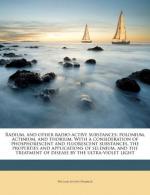|
This section contains 197 words (approx. 1 page at 300 words per page) |
Actinium is the third element in Row 7 of the periodic table. Its atomic number is 89 and chemical symbol is Ac. Actinium is a radioactive element, whose most common isotope has a mass of 227.
Properties
Only a limited amount of information is known about the properties of actinium. It is a silver metal with a melting point of 1,922°F (1,050°C) and a boiling point of 5,792°F (3,200°C). Its chemical properties are similar to those of lanthanum, the element above it in the periodic table.
Occurrence and Extraction
Actinium occurs only rarely in the Earth's crust. It is usually found with ores of uranium, where it is produced by the radioactive decay of that element.
Discovery and Naming
Actinium was discovered by the French chemist André Debierne (1874-1949) in 1899. Debierne was a close friend of Marie Curie and her husband Pierre. The Curies were among the first scientists to study the new phenomenon of radioactivity in the 1890s. They discovered two new elements themselves, polonium and radium. Actinium was named after the Greek words aktis or aktinos, meaning "beam" or "ray."
Uses
There are no practical uses for actinium, although it is sometimes used in research.
|
This section contains 197 words (approx. 1 page at 300 words per page) |


